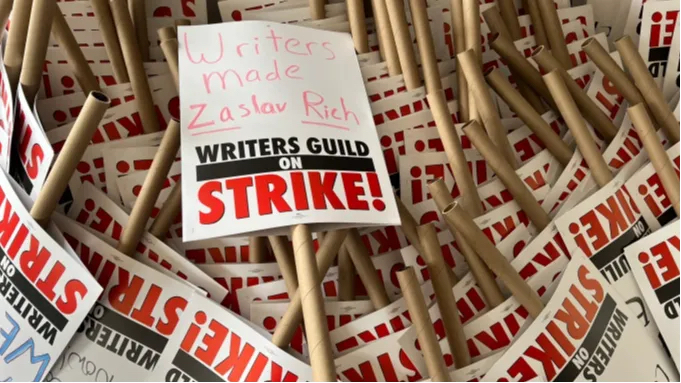Screenwriters across the US have taken to the picket line for the first time since 2007-08, with the Writers Guild of America (WGA) making the use of artificial intelligence (AI) in film and TV production one of its key points of contention.
Most of the negotiating is based around antiquated contracts which were established before the advent of streaming, with writers still receiving a significant amount of their residual income based on reruns and syndication.
This, the WGA argues, is not a consideration for hit streaming-exclusive shows like Stranger Things and Ted Lasso, published by Netflix and Apple TV+ respectively, meaning that writers have seen their wages stagnate or decrease at a time when production budgets have ballooned to be on par with big budget blockbuster movies.
But while the argument of wages is pressing for the present, the WGA is concerned that studios could use AI to effectively replace writers in an effort to make streaming service more profitable and deal with shrinking ad revenues.
In a document noting the state of negotiations, the WGA on AI said that it had proposed to “regulate use of artificial intelligence on MBA-covered projects: AI can’t write or rewrite literary material; can’t be used as source material; and MBA-covered material can’t be used to train AI.”
The guild says that this was rejected, with the Alliance of Motion Picture and Television Producers (AMPTP) offering annual meetings.
Representatives from the WGA have argued that while AI will not come up with ideas out of nothing, studios could plug ideas into an AI for a sloppy first draft and then hire a real writer to produce a second draft at a fraction of the cost.
In comments to Reuters, screenwriter John August, a member of the WGA negotiating committee, also highlighted the problematic nature of AIs being trained on existing scripts as this would open the door to intellectual property theft.
The writer referred to the ‘Nora Ephron problem’ (the late Ephron wrote movies including When Harry Met Sally and You’ve Got Mail). “One can imagine a studio training an AI on all of Nora Ephron's scripts, and having it write a comedy in her voice. Our proposals would prevent that," he said.
As such the WGA’s chief negotiator Ellen Stutzman has referred to AI as “plagiarism machines”, saying: “We have made a reasonable proposal that the company should keep AI out of the business of writing television and movies and not try and replace writers.”
Latest News
-
Indra wins TfL contract to run London ticketing systems
-
Japan ‘launches government probe’ into Grok
-
Social media sites stop access to 4.7m under-16 accounts in Australia
-
Government announces £52m funding to support British robotics and defence tech firms
-
Swift to launch blockchain-based shared ledger after successful digital asset pilot
-
AWS launches European sovereign cloud service
The future-ready CFO: Driving strategic growth and innovation
This National Technology News webinar sponsored by Sage will explore how CFOs can leverage their unique blend of financial acumen, technological savvy, and strategic mindset to foster cross-functional collaboration and shape overall company direction. Attendees will gain insights into breaking down operational silos, aligning goals across departments like IT, operations, HR, and marketing, and utilising technology to enable real-time data sharing and visibility.
The corporate roadmap to payment excellence: Keeping pace with emerging trends to maximise growth opportunities
In today's rapidly evolving finance and accounting landscape, one of the biggest challenges organisations face is attracting and retaining top talent. As automation and AI revolutionise the profession, finance teams require new skillsets centred on analysis, collaboration, and strategic thinking to drive sustainable competitive advantage.
© 2019 Perspective Publishing Privacy & Cookies








Recent Stories